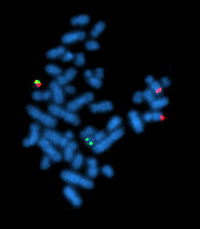
Photo from wikipedia
ABSTRACT Objective: We herein describe two cases of de novo lymphoid blastic transformation in patients with no history of chronic-phase chronic myeloid leukemia (CP-CML), both of whom were labeled initially… Click to show full abstract
ABSTRACT Objective: We herein describe two cases of de novo lymphoid blastic transformation in patients with no history of chronic-phase chronic myeloid leukemia (CP-CML), both of whom were labeled initially as Philadelphia positive B-Acute Lymphoblastic Leukemia (B-ALL). Methods: The first patient was an 18-year-old male who presented with subjective fever, intentional weight loss, generalized fatigue, and headache. Investigations showed leukocytosis (312 × 10^3/ul), thrombocytopenia and anemia. Flowcytometry was consistent with B-ALL, with aberrant expression of CD13 and CD33. He was found to be positive for BCR::ABL by FISH, and karyotype confirmed the presence of the Philadelphia chromosome. He received a pediatric-inspired regimen and achieved remission with negative measurable residual disease (MRD) by flowcytometry, however with persistent cytogenetic abnormality using FISH for BCR::ABL. FISH abnormality was confirmed to be in the myeloid compartment using myeloid segregated FISH, reclassifying the disease to de novo lymphoid blastic phase CML. The second patient was a 52-year-old male who presented with fever and shortness of breath. Bilateral cervical lymphadenopathy and hepatosplenomegaly were identified on examination, and investigations showed leukocytosis (371 × 10^3/ul), anemia, and thrombocytopenia. BCR::ABL rearrangement was identified by FISH, molecular testing, and confirmed with karyotype. He was treated with Mini-CVD and Ponatinib, achieved complete remission with negative MRD by flow cytometry, however molecular studies showed BCR-ABL1 level at 58% IS indicating a persistent cytogenetic abnormality. Results: De novo lymphoid blastic-phase CML can therefore be difficult to differentiate from Philadelphia positive B-ALL due to their overlapping clinical and laboratory picture, implying the need to do myeloid compartment evaluation at the time of diagnosis. Conclusion: With recent progress in the treatment of Philadelphia positive B-ALL, including the role of transplant with the use of novel agents, a better characterization of this disease entity in retrospective and prospective trials is warranted.
Journal Title: Hematology
Year Published: 2022
Link to full text (if available)
Share on Social Media: Sign Up to like & get
recommendations!